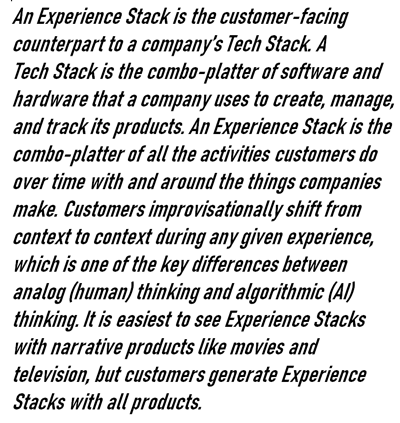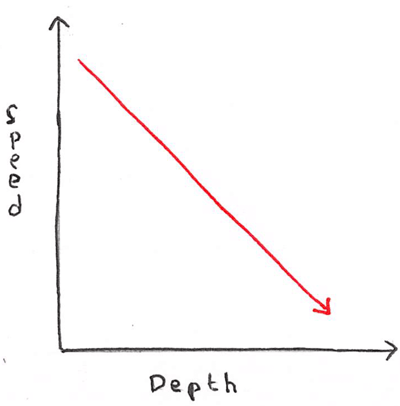Attention is not a currency
Attention is not a currency
“Paying attention,” a common metaphor, is misleading because there are different sorts of attention, and the relationship among them isn’t reducible to numbers.
By Brad Berens
If you’re in the Attention Business—and whether you’re selling movies, cars, toothpaste, whoopee cushions, sex toys, health insurance, a ride hailing service, or a new ointment for that embarrassing rash, every business is in the attention business—then understanding that there’s more than one sort or attention is a good first step towards getting the right sorts of attention for your business.
Attention creates experience. In Principles of Psychology (1890), William James wrote, “my experience is what I agree to attend to.”
Context amplifies and changes experience so that two people with different contexts can experience the same moment in distinct ways. Here are two examples from entertainment, but the phenomenon holds true across the experience of many products.
Shakespeare’s Romeo and Juliet: As 13-year-old Juliet is about to stab herself to death, she says something that changes the playgoing experience for the people in any audience familiar with Latin. “O happy dagger. This is thy sheath. There rust, and let me die.”
The Latin word for “sheath” is “vagina.”*
Playgoers who don’t have a little Latin experience this tragic moment in an agonizing but uncomplicated way. For playgoers who do have a little Latin, that knowledge can dislocate them from the agony with troubling questions: Is Juliet making a pun as she is stabbing herself? Is Shakespeare making the pun through Juliet? (If Freud had Latin, then he must have enjoyed a heady, cocaine-fueled evening working through this one.)
 The difference between how the playgoers with and without Latin encounter this moment comes from their different Experience Stacks.
The difference between how the playgoers with and without Latin encounter this moment comes from their different Experience Stacks.
Castle, Season 5, Episode 6: In “The Final Frontier” (2012), Beckett and Castle investigate a murder at a science fiction convention involving the cast of a long-cancelled TV show that resembles Star Trek. Director Jonathan Frakes, who played “Number One” (first officer William Riker) in Star Trek: The Next Generation, makes an early cameo and says, “I’m your number one fan” to Castle. Armin Shimerman, who played Quark in Star Trek: Deep Space Nine, plays a key role. The episode is chock full of references to other science fiction shows, including Firefly, a show that starred Nathan Fillion, who plays Castle.
If a viewer’s Experience Stack includes any of these other shows, then in multiple moments awareness of those other shows erupts into consciousness, only to fade away as the plot gains momentum—like what happens to still water a while after you’ve dropped a stone into it.
Unlike in-jokes and Easter Eggs, neither Juliet’s pun nor the abundant science fiction references in Castle depend on prior knowledge of Shakespeare or Castle: they depend on external knowledge of Latin and other TV shows.
Another way of putting this is that these sorts of references elicit a particular type of attention that doesn’t fit into our common metaphor of attention as a kind of currency.
The two different kinds of attention
We all use the phrase “pay attention!” when we’re asking another person to focus on a task at hand, and the phrase suggests that we can measure all attention quantitatively, and that different sorts of attention are interchangeable like money.
They’re not.
Different schools of thought talk about two general modes of attention: Automatic and Deliberate. We need both to make it through our waking hours without either despairing because our lives are racing past us or bursting because we have so many things to think about.
The more focused attention you give to something, the slower time goes. This explains why a two-day vacation can feel like a week, but a week can disappear and feel like a day. On vacation, you don’t know where anything is or how to get anyplace, so you do more Deliberate thinking. The more Deliberate your cognition the slower your perception of time, the more Automatic the faster.
Automatic: this mode is fast but superficial. Behavioral Economist Daniel Kahneman calls this System 1, which is useful but lacks poetry. Some social scientists call this “schema-driven” processing. The early twentieth century Russian literary critic Viktor Shklovsky called this recognition. This is lantern attention: general, omnidirectional, casting its light indiscriminately.
Deliberate: this mode is deep but slow. This is Kahneman’s System 2 and the “data-driven” processing of social scientists. It is “seeing” for Shklovsky, who thought the purpose of art was to make things we’re accustomed to recognizing “strange” so that we can see them afresh. Instead of a lantern, this is spotlight attention, focused, unidirectional, zeroing in.
Experience Stacks rely on Deliberate attention.
 There’s an inverse relationship between depth and speed (right).
There’s an inverse relationship between depth and speed (right).
The more focused attention you give to something, the slower time goes. This explains why a two-day vacation can feel like a week, but a week can disappear and feel like a day. On vacation, you don’t know where anything is or how to get anyplace, so you do more Deliberate thinking. The more Deliberate your cognition the slower your perception of time, the more Automatic the faster.
As we saw with the Shakespeare and Castle examples, we don’t use the two modes separately: we improvisationally switch back-and-forth between them moment-to-moment.
It’s hard to describe the relationship between Automatic and Deliberate thinking: there’s a VENN diagram in there somewhere, but the overlap wiggles around like a boneless three year old trying to slide out of his mother’s arms. Automatic thinking emerges from Deliberate thinking, but the relationship is more than quantitative.
The least bad metaphor I’ve been able to come up with so far is the relationship between—on one hand—water, flour, yeast, salt, and time, and—on the other hand—a loaf of bread. If attention were a currency, then you should be able to break a loaf of bread back down into its component parts, but you can’t. The difference between the ingredients and the loaf comes from time in the oven.
The reason I’m unhappy with this metaphor is that it privileges the bread, the Automatic thinking, at the expense of the Deliberate thinking. Who cares about a bunch of ingredients? I just want something I can use to make a sandwich.
What’s important is the baking.
__________

Brad Berens is the Center’s strategic advisor and a senior research fellow. He is principal at Big Digital Idea Consulting. You can learn more about Brad at www.bradberens.com, follow him on Post and/or LinkedIn, and subscribe to his weekly newsletter (only some of his columns are syndicated here).
* The earliest recorded use of “vagina” to refer to female anatomy was 1612, but even if it wasn’t a common term to the first audiences of the play, the association between sheaths and female anatomy dates back thousands of years. It’s certainly available to Latin-knowing playgoers in the centuries since 1612.
See all columns from the Center.
March 24, 2023

